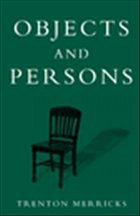There are no statues. Or rocks. Or chairs. Or stars. But there are microscopic objects arranged statuewise and rockwise and chairwise and starwise. Moreover, there are--in addition to microscopic objects arranged humanwise--composite human beings. Or so Trenton Merricks argues. The ontology of Objects and Persons is motivated, in large part, by causal considerations. One of the central ideas is that physical objects are causally non-redundant: physical objects cause things that are not wholly overdetermined by their proper parts. Merricks 'eliminates' statues and other inanimate composite macrophysical objects on the grounds that they would--if they existed--be at best completely causally redundant. Merricks defends our existence by arguing, from certain facts about mental causation, that we human beings cause things that are not overdetermined by our proper parts. A second strand of argument for Merricks's overall ontology involves a variety of philosophical puzzles, puzzles that are dealt with in illuminating and often novel ways. Many other issues are addressed along the way, including free will, the 'reduction' of a composite object to its parts, and the ways in which identity over time can "for practical purposes" be a matter of convention. Anyone working in metaphysics will enjoy this lucid and provocative book.
Review quote:
'With style and wit, Merricks stakes out an original position and defends it with an abundance of interesting, carefully formulated arguments. His book is sure to be one of the standard points of reference for the growing number of philosophers interested in these issues.' (Michael B. Burke, Philosophical Review)
The argument is densely woven, ingeniously defended ... Merricks is a first-rate young philosopher with a book that deserves the attention of anyone interested in the metaphysics of human persons. There is much to be learned simply figuring out how best to resist Merrick's finely wrought argument ... Perhaps few readers will cease believing in baseballs. But the proportion of readers convinced has never been a good measure of the value of a book of metaphysics. (Dean W. Zimmerman, Times Literary Supplement)
Objects and Persons presents a metaphysical vision of great power and originality. It is marvellously subversive, threatening comfortable assumptions at every turn. Yet it is all backed by sober argument. These matters cry out for further exploration. Above all, the book shows that the ontology of material objects has surprisingly important and far-reaching consequences. There can no longer be any doubt about its place as a central topic in philosophy. (Eric Olson, Philosophical Books)
Objects and Persons presents an original theory about what kinds of things exist. Trenton Merricks argues that there are no non-living inanimate macrophysical objects -- no statues or rocks or chairs or stars -- because they would have no causal role over and above the causal role of their microphysical parts. Humans do exist: we have non-redundant causal powers. Along the way, Merricks has interesting things to say about mental causation, free will, and various philosophical puzzles. Anyone working in metaphysics will enjoy this lucid and provocative book.
Review quote:
'With style and wit, Merricks stakes out an original position and defends it with an abundance of interesting, carefully formulated arguments. His book is sure to be one of the standard points of reference for the growing number of philosophers interested in these issues.' (Michael B. Burke, Philosophical Review)
The argument is densely woven, ingeniously defended ... Merricks is a first-rate young philosopher with a book that deserves the attention of anyone interested in the metaphysics of human persons. There is much to be learned simply figuring out how best to resist Merrick's finely wrought argument ... Perhaps few readers will cease believing in baseballs. But the proportion of readers convinced has never been a good measure of the value of a book of metaphysics. (Dean W. Zimmerman, Times Literary Supplement)
Objects and Persons presents a metaphysical vision of great power and originality. It is marvellously subversive, threatening comfortable assumptions at every turn. Yet it is all backed by sober argument. These matters cry out for further exploration. Above all, the book shows that the ontology of material objects has surprisingly important and far-reaching consequences. There can no longer be any doubt about its place as a central topic in philosophy. (Eric Olson, Philosophical Books)
Objects and Persons presents an original theory about what kinds of things exist. Trenton Merricks argues that there are no non-living inanimate macrophysical objects -- no statues or rocks or chairs or stars -- because they would have no causal role over and above the causal role of their microphysical parts. Humans do exist: we have non-redundant causal powers. Along the way, Merricks has interesting things to say about mental causation, free will, and various philosophical puzzles. Anyone working in metaphysics will enjoy this lucid and provocative book.
